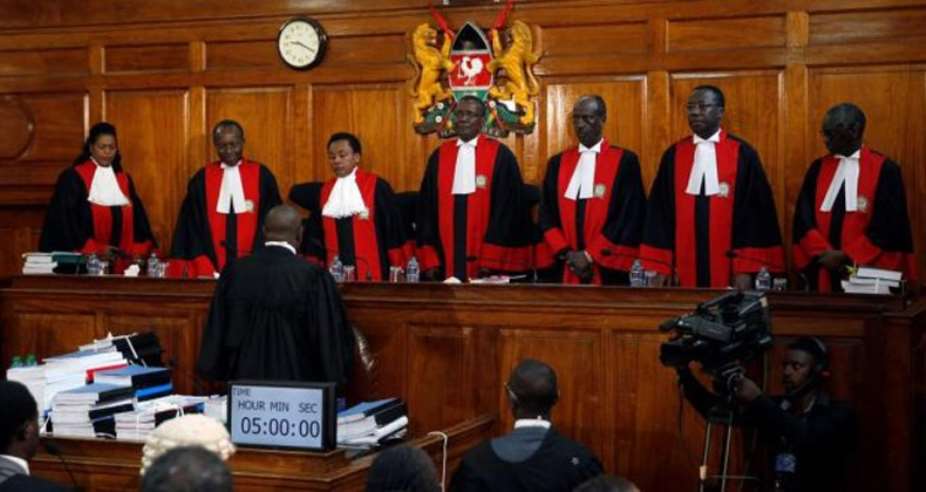On August 8, millions of Kenyans formed long, orderly queues outside polling stations across the country to vote in presidential and local elections. Kenya is notorious for corruption, and virtually all previous elections had been marred by rigging.
This time, however, the US and Kenya's other donors had invested $24 million in an electronic vote-tallying system designed to prevent interference.
When Kenya's electoral commission announced on August 11 that President Uhuru Kenyatta had won another five-year term with over 54% of the vote, observer teams from the African Union, the European Union, Commonwealth Election Observer Group led by Ghana's former President John Dramani Mahama, as well as the highly respected US-based Carter Center, led by former Secretary of State John Kerry, unanimously gave the process a clean bill of health.
However, not everyone was happy. Raila Odinga, leader of the opposition National Super Alliance party, (NASA), declared the election a sham as soon as the results began coming in. In spite of the opposition's protests, Chairman of the Kenyan Independent Electoral and Boundaries Commission (IEBC) Wanyonyi Wafula Chebukati on August 11 declared for incumbent President Uhuru Kenyatta to continue another 5-year term.
Mr. Odinga, 72, not satisfied, filed a petition at the Supreme Court on August 18, asking the court to annul the polls results and order a re-vote. The petition claims, among other things, that nearly half of all votes cast had been tampered with; that NASA's agents, who were entitled by law to observe the voting and counting, had been thrown out of polling stations in Kenyatta strongholds; and that secret, unofficial polling stations had transmitted fake votes. And that is what the court has done precisely. The results have been annulled a re-election ordered.
On August 29, the court registrar reported that some 5 million votes, enough to affect the outcome, were not verified.
Under the Kenyan constitution, no one is sworn in as President during the pendency of the petition. The petition was decided in 14 days and has to be decided by the full bench made up of only seven judges including the Chief Justice. Under the rules, unconstitutional means unconstitutional. Because a previous election (2007) plunged the country into civil war, Kenyans consider an election as a process not an event.
Opposition leader Raila Odinga and his NASA after providing incontrovertible evidence that the whole election was rigged has been able to get the Supreme Court to nullify the August 8 re-election of Uhuru Kenyatta. The court has ordered a re-run within 60 days.
The Kenyan Supreme Court agrees with the petitioner that the presidential election was not conducted in accordance with the constitution and that there were widespread irregularities.
We see the Kenyan Supreme Court's decision as a historic move that is going to be a guiding post for many countries in Africa when they face identical election rigging situations. Ghana got a similar chance in 2013 but for some strange reasons blew that chance to make Africa great. In fact that action by the Supreme Court appeared to have emboldened other African leaders who are in the habit of rigging elections using their respective electoral commissions. However, thankfully, the Kenyans have proven that a rigged election results can be overturned after all.
What Chief Justice Maraga of Kenya and his gallant colleagues have done has shown that International Observers do not always tell the full story. They have been caught pants down if you have followed the Kenyan example.
Also, we saw that ICT in elections presents severe risks and it is up to Election bodies to manage the ICT risks. Election bodies must include political parties and citizens throughout the whole process to avoid rigging with its negative consequences.
The development in Kenya signals that Africa is on the right trajectory. The efficiency with which Kenya’s Supreme Court addressed the Presidential petition is admirable. The issues that the Justices had to resolve were complex and the evidence on hacking and troubled votes was dazzling. This is a courageous decision bound to inspire other countries and help purify the sanctity of the ballot in Africa.





 Akufo-Addo commissions Phase II of Kaleo solar power plant
Akufo-Addo commissions Phase II of Kaleo solar power plant
 NDC panics over Bawumia’s visit to Pope Francis
NDC panics over Bawumia’s visit to Pope Francis
 EC blasts Mahama over “false” claims on recruitment of Returning Officers
EC blasts Mahama over “false” claims on recruitment of Returning Officers
 Lands Minister gives ultimatum to Future Global Resources to revamp Prestea/Bogo...
Lands Minister gives ultimatum to Future Global Resources to revamp Prestea/Bogo...
 Wa Naa appeals to Akufo-Addo to audit state lands in Wa
Wa Naa appeals to Akufo-Addo to audit state lands in Wa
 Prof Opoku-Agyemang misunderstood Bawumia’s ‘driver mate’ analogy – Miracles Abo...
Prof Opoku-Agyemang misunderstood Bawumia’s ‘driver mate’ analogy – Miracles Abo...
 EU confident Ghana will not sign Anti-LGBTQI Bill
EU confident Ghana will not sign Anti-LGBTQI Bill
 Suspend implementation of Planting for Food and Jobs for 2024 - Stakeholders
Suspend implementation of Planting for Food and Jobs for 2024 - Stakeholders
 Tema West Municipal Assembly gets Ghana's First Female Aircraft Marshaller as ne...
Tema West Municipal Assembly gets Ghana's First Female Aircraft Marshaller as ne...
 Dumsor is affecting us double, release timetable – Disability Federation to ECG
Dumsor is affecting us double, release timetable – Disability Federation to ECG
